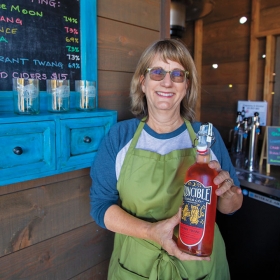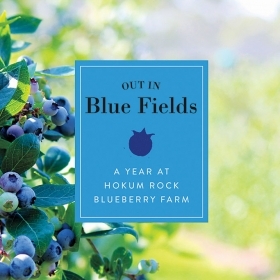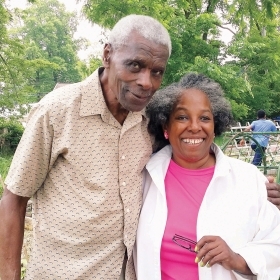Kelly Miller McCune ’80
For years, Kelly Miller McCune ’80 and her family vacationed in Oregon’s Columbia River Gorge, an area full of orchards, vineyards, and waterfalls. A few years later, they were back as orchard owners themselves, founding Runcible Cider in 2017.

For years, Kelly Miller McCune ’80 and her family vacationed in Oregon’s Columbia River Gorge, an area full of orchards, vineyards, and waterfalls. “We fell in love,” she says, and saw the national scenic area as a possible place to retire.
When her kids left for college, Kelly and her husband, Rob, had a realtor take them around Mosier, a town of 485 known for its entrepreneurs and cherry orchards. “We ended up buying 10-acre piece of property with ailing cherry trees on it,” Kelly says.
The couple let the property sit for seven years. Then Kelly, who has a background in food writing and authored cookbooks, decided she wanted to spend her retirement making something edible. For three years, she studied cheesemaking, but the lessons didn’t stick. One day while on vacation, her husband said, what about cider? Back home in Pasadena, Calif., they started experimenting with fermentation in their garage, and then had 80 cider apple trees planted on their Mosier property.
In 2016, they moved from California to Oregon and made their first hard cider. The following year, the couple founded Runcible Cider, a cidery that sells draft cider at restaurants across the state, and bottles. The name comes from a made-up word in an 1871 poem, “The Owl and the Pussy-Cat,” by Edward Lear. The characters dined with a “runcible spoon.” Kelly and her husband have text from the poem engraved on their wedding rings. “To us, runcible means something solid and special, something you wouldn’t leave home without,” she says.
The self-proclaimed commander-in-chief of the cidery, Kelly works with her husband and one employee to hand-pick apples from their now 1,000 trees, wash them in well water, and then run them through their mill before pressing and fermenting the juice in their cider barn. She makes pure cider, but she also infuses ciders with herbs and fruit from neighboring orchards—cherries and peaches—to make flavored varieties.
Year-round, the couple blends and packages cider, and in the spring, they run an outdoor tasting room. This year, it closed due to COVID-19. But in past years, it’s been packed with locals and visitors sipping on ciders like Cherry Twang or Elderflower Pear.
“The business really created a community for us,” Kelly says.
Over the years, she’s learned how to delegate. “Though I’m still not very good at that. It’s the Wellesley syndrome,” she says. She’s also been surprised by how physical the business is, with its pruning and picking and pressing.
The cidery was humming along until the pandemic hit. Kelly canceled an annual event where friends help pick apples, and their restaurant business took a hit, though bottle sales have been strong. To counter losses, she started selling cider online and shipping. Now, she’s thinking ahead to what the tasting room will look like later this year.
“I think people will still be wearing masks,” Kelly says, “and you can’t be wearing masks when sipping. We’re trying to balance being practical in our expectations, but not write the whole thing off. We want to do it right.”


